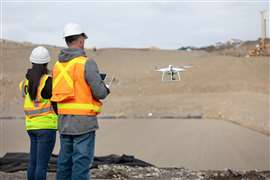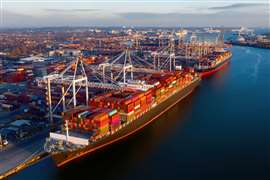Cruising speed: IRN reports from the European Rental Association's 2010 convention in Prague.
28 September 2010

‘New Opportunities' was the theme for this year's European Rental Association (ERA) Convention, held on 26-27 May in Prague. Murray Pollok reports from the city's Corinthian Towers Hotel.
The forward-looking theme of ‘new opportunities', had been chosen for this year's ERA Convention with the aim, perhaps, of taking delegates minds away from the difficult conditions they face back in their offices.
But, as ERA president Gerard Deprez pointed out, opportunities can mean many things: new markets, different approaches to existing markets, and the opportunities that follow from business reorganisation.
Rental managers had no alternative but to "keep going", said Mr Deprez; "For everyone, the crisis has been so severe and lengthy that we fail to see a way out. It seems we face nothing but problems....[but] we must not be blinded by the crisis. And managers cannot spend their time tending to problems. This is why this Convention motto ‘new opportunities for rental' encourages us also to focus on the opportunities we may find".
More than 250 delegates attended the convention - including rental managers from Poland, Czech Republic, Bulgaria, Romania, Hungary, Slovakia and Turkey - and Mr Deprez said this was evidence that the organisation had reached its "cruising speed...Your attendance encourages committees' members to outdo themselves and motivates our secretarial staff."
The choice of Prague as the venue was significant, said Mr Deprez; "we wanted to underline the strong development undergone by the rental industry in Central Europe in the last decade. Despite the present situation, these countries actually are the only growth area in Europe for the upcoming years."
On these two pages we report on a number of the seminars and presentations. To download all the presentations from the conference visit the ERA's website www.erarental.org
Learning from crisis
The following is an edited extract from Gérard Déprez's speech at the ERA Convention.
"We can say that 2009 truly was an annus horribilis for our trade. Never did our industry meet such a severe activity drop, for some countries down 40%. No one was spared. We are all refugees who suffered more or less from the storm.
Those who suffered less should consider themselves lucky.
As a reaction to the crisis, our industry showed consistent and responsible behaviour. Almost everyone stopped opening new branches and all cut growth
investment. Many closed down branches and reduced staff. Companies clearly
expressed their will to release free cash-flow to cut debt and thereby reduce the risk of insolvency. And, in addition to these measures, some deliberately reduced their fleet to boost utilisation rates.
But did rental operators have any choice when their costs are 70 to 80% fixed costs
and as activity decreases by 30%? Of course, we may worry about losing market
share, but at the end of the game competitive positions remain unchanged.
The adjustment to market conditions also triggered an unprecedented price drop.
This only worsened rental companies' financial situation. The temptation to blame one's competitors is high, but I saw an overall price decrease everywhere, no matter
who the competitors were.
What lessons do we learn from this crisis?
1. Rental operators can experience a crisis due to entirely external factors: economic crisis, competition, financial or a banking sector crisis. We must keep in mind that rental companies can be seriously shaken whatever their own performance.
2. Network expansion also has its limits. Diversification is no longer an asset when
the crisis hits all sectors simultaneously.
3. The third lesson addresses the importance of cash in our highly indebted
companies. Cash can no longer be underestimated because the actions of the financial sector can be both sudden and unforeseeable.
4. Finally, despite the fact that our business operates over long cycles, we also have
to learn how to deal with very short-term cycles. I fear that our industry, which is accustomed to long phases of growth, will have to address a greater volatility of its activity and profits.
At last year's Convention in Manchester I predicted that 2010 would be worse than 2009, as recession would peak in spring 2010, and that recovery would be visible in our 2011 accounts. This is now confirmed by Global Insight in its forecasts for the next two years.
However, the Greek crisis stressed the risk of States' insolvency or, more accurately,
the risk of increased refinancing rates. Obviously, governments will be under pressure to postpone infrastructure projects that were supposed to boost economic recovery. This is very bad news for our trade.
As for me, I do not believe in an actual recovery but more of a lengthy end to the crisis because of the banking sector's difficulties and European countries' debt.
Finally, if we do not expect recovery, we nonetheless remain confident on an end to the crisis next year."
New services model
New ways of organising major rental contracts are pushing rental companies to offer additional services to customers, said Kristin Hancock, managing director of Speedy Engineering Services (SES), a division of UK rental company Speedy, speaking at one of the ERA workshops.
Mr Hancock told a packed conference room that additional services such as testing and inspection, asset management and the provision of fully serviced temporary offices were one impact of the move for clients to get "more value" from their biggest rental supplier contracts.
Hand in hand with this is a shift to a new structure for major rental contracts. The traditional model - with large and small rental companies working for a number of major and sub-contractors - changed when major contractors started to negotiate large rental contracts with big rental companies who then managed the smaller rental companies on behalf of the contractor and sub-contractors.
That ‘integrated supply chain' method of managing rental contracts was now evolving to a further level, said Mr Hancock, with new ‘client framework' contracts where the ultimate client (such as a utility company) procures rental services directly, by-passing the major contractor.
Mr Hancock said these types of contracts - which are only now being procured - give a rental company "customer intimacy. You become more intimate if you provide more services, which leads to longer relationships, which leads to transparency of earnings."
Although emerging first in the utilities sector, Mr Hancock said it was a model that he expected to see in other sectors, and also eventually outside the UK.
Eastern promise
Ramirent CEO Magnus Rosén said Eastern and Europe remained a market with enormous rental potential, even if the financial crisis had seen Ramirent's business in the region fall by 50% over the past 15 months.
"These markets are still quite underdeveloped", he said, "There are large infrastructure projects planned, so there will be large opportunities." Mr Rosén said the key to success in the region was having a good depot network; "otherwise it will be difficult."
Mr Rosén highlighted Poland as a particularly attractive market, although the drawback had been that "everyone realised in 2009 that Poland was heaven. We saw a lot of equipment moved into Poland - that hit prices."
He described Russia as the region's most challenging market; "and also the market where we have the most possibilities, all of us." The market is dominated by Moscow and St Petersburg "and is very undeveloped - the penetration could increase tremendously. It would be good if more rental companies entered Russia."
John Monaghan, managing director of Polish company Atut Rental, acknowledged that investment in motorways, railways, stadiums, airports and bridges made Poland an obvious target for rental, but he warned that pricing was under pressure and there were difficulties in getting paid ("like pulling teeth").
"Poland is an attractive market", said Mr Monaghan, "but there are great cautions. My advice is, first of all, don't, but if you do, the timing is crucial. You have to pay very close attention to what customers actually want - there's no point offering a bikini if they need a coat."
CONVENTION HIGHLIGHTS
The new European Rental Association (ERA) board was voted in during the Prague Convention. New members are Arne Bugge (Norwegian Rental Association), Marzia Giusto (Nacanco) and Vesa Koivula (Cramo). The new board, from left, is: Gérard Déprez (Loxam), Peter Schrader (MVS Zeppelin), Vesa Koivula (Cramo), Marzia Giusto (Nacanco), Kevin Appleton (Lavendon Group), Colin Wood, (Construction Plant-hire Association) and Arne Bugge (Norwegian Rental Association). Current president Gérard Déprez, who is chief executive officer of Loxam, remains in place and will serve a second term as president. Previous board members who have left were Erkki Norvio (Ramirent board member) and Franco de Michelis (Assodimi).
Julie Masters, marketing manager at Result Group, presented Mikael Kämpe, Ramirent's group fleet director, with an Apple iPad he won in a prize draw run by the software company during the convention. Result used the event to demonstrate the use of the iPad to run the mobile version of its rental software.
ERA Convention
& IRE Show 2011
ERA's 2011 convention will take place during the second International Rental Exhibition (IRE) in Amsterdam on 7-9 June. As with the 2008 event, the IRN/ERA rental awards will again be an expanded version, with double the number of award categories.
The exhibition is being organised by Netherlands exhibitions company IPI in official cooperation with ERA and IRN magazine.
ERA president Gérard Déprez said in Prague that the show was perfectly timed for the recovery; "With a doubled exhibition area, IRE will be the largest European rental equipment show in 2011. No one can miss this opportunity. Make the most of the recovery and save the date now."
See www.ireshow.com for more details.






